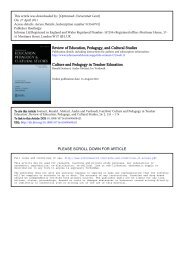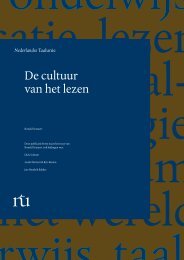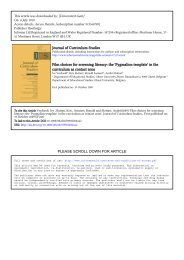a view informed by the problems of traditional literacy in a digital age
a view informed by the problems of traditional literacy in a digital age
a view informed by the problems of traditional literacy in a digital age
You also want an ePaper? Increase the reach of your titles
YUMPU automatically turns print PDFs into web optimized ePapers that Google loves.
Downloaded <strong>by</strong> [University <strong>of</strong> Gent] at 06:46 09 December 2011<br />
Ronald Soetaert & Bart Bonamie<br />
<strong>traditional</strong> card system which, however, failed to satisfy him <strong>in</strong> several<br />
respects. He decided to take a course <strong>in</strong> programm<strong>in</strong>g to develop a system<br />
that not only brought order to <strong>in</strong>formation but was also able to l<strong>in</strong>k that<br />
<strong>in</strong>formation – and texts – on various levels and <strong>in</strong> various ways. In fact, <strong>the</strong><br />
World Wide Web has gone on fulfill<strong>in</strong>g this hypertextual dream Ted Nelson<br />
<strong>in</strong>troduced so long ago. To be sure, <strong>the</strong> new genre has been criticised <strong>by</strong><br />
adherents <strong>of</strong> a more <strong>traditional</strong> <strong>literacy</strong> and is characterised as ‘ano<strong>the</strong>r<br />
doma<strong>in</strong> <strong>of</strong> <strong>the</strong> postmodern <strong>the</strong>me park. Gentle readers, welcome to<br />
Literacyland!’ (Moulthrop, 1991). Yet, it is <strong>in</strong>terest<strong>in</strong>g to stress <strong>the</strong> fact that<br />
Ted Nelson sees <strong>the</strong> history <strong>of</strong> writ<strong>in</strong>g as an epic <strong>of</strong> recovery. His grand hope<br />
was ‘a return to <strong>literacy</strong>, a cure for television stupor, a new Renaissance <strong>of</strong><br />
ideas and generalist understand<strong>in</strong>g, a grand posterity that does not lose <strong>the</strong><br />
details which are <strong>the</strong> f<strong>in</strong>al substance <strong>of</strong> everyth<strong>in</strong>g’ (Nelson, 1990b, p. 4).<br />
But from <strong>the</strong> very beg<strong>in</strong>n<strong>in</strong>g, hypertext also promised to be a different<br />
genre for writ<strong>in</strong>g and read<strong>in</strong>g. What did <strong>the</strong> genre promise?<br />
Read<strong>in</strong>g Pr<strong>in</strong>t and Hypertext<br />
Pr<strong>in</strong>t culture constructed a k<strong>in</strong>d <strong>of</strong> passive read<strong>in</strong>g; it created ‘closed’ and<br />
‘completed’ texts and <strong>in</strong>troduced <strong>the</strong> idea <strong>of</strong> ‘proper read<strong>in</strong>g’. These ideas<br />
were taken up <strong>by</strong> <strong>the</strong> New Critics – from <strong>the</strong> structuralist movement – who<br />
deconstruct <strong>the</strong> mean<strong>in</strong>g <strong>of</strong> a text <strong>by</strong> ‘close read<strong>in</strong>g’: a careful analysis <strong>of</strong> <strong>the</strong><br />
words, which is isolated from <strong>the</strong> actual world. In such a closed system,<br />
mean<strong>in</strong>g could <strong>in</strong>deed be <strong>in</strong>terpreted <strong>by</strong> analys<strong>in</strong>g <strong>the</strong> parts <strong>of</strong> <strong>the</strong> structure.<br />
For a long time, this perspective deeply <strong>in</strong>fluenced how read<strong>in</strong>g (and<br />
literature) was taught, how ideal read<strong>in</strong>g was described.<br />
In more modern read<strong>in</strong>g <strong>the</strong>ories, texts are no longer seen as closed<br />
systems because <strong>the</strong>y <strong>of</strong>fer readers open end<strong>in</strong>gs and <strong>in</strong>secure l<strong>in</strong>ks. Apart<br />
from <strong>the</strong>se textual characteristics, mean<strong>in</strong>g also <strong>in</strong>tersects with <strong>in</strong>dividual<br />
readers’ experiences. This is stressed <strong>in</strong> reader response <strong>the</strong>ory and<br />
reception <strong>the</strong>ory. By stress<strong>in</strong>g a more active and open way <strong>of</strong> read<strong>in</strong>g, <strong>the</strong>se<br />
read<strong>in</strong>g <strong>the</strong>ories were prepar<strong>in</strong>g us for <strong>the</strong> emergence <strong>of</strong> hypertext read<strong>in</strong>g.<br />
Indeed, hypertext creates a different k<strong>in</strong>d <strong>of</strong> read<strong>in</strong>g that is less<br />
submissive and passive, and also less ‘complete’ and less ‘closed’.<br />
In such an open system, mean<strong>in</strong>g becomes a perspective <strong>in</strong> a dynamic<br />
structure. In hypertexts we are confronted with lots <strong>of</strong> l<strong>in</strong>ks; a total and<br />
absolute experience is not possible.<br />
Of course, what is said about read<strong>in</strong>g is true for writ<strong>in</strong>g as well. In<br />
<strong>traditional</strong> teach<strong>in</strong>g <strong>the</strong> essay was considered a major genre <strong>in</strong> <strong>the</strong> writ<strong>in</strong>g<br />
curriculum, certa<strong>in</strong>ly <strong>in</strong> academia. From a communicative approach,<br />
criticism aga<strong>in</strong>st <strong>the</strong> essay was based on <strong>the</strong> fact that such writ<strong>in</strong>g had<br />
noth<strong>in</strong>g to do with <strong>the</strong> real world. The communicative approach was<br />
obsessed <strong>by</strong> creat<strong>in</strong>g ‘real communicative sett<strong>in</strong>gs’ which would stimulate<br />
real writ<strong>in</strong>g. The problem was that writ<strong>in</strong>g was not popular at all outside<br />
academia, art and o<strong>the</strong>r pr<strong>of</strong>essional environments. Today we can welcome<br />
134





